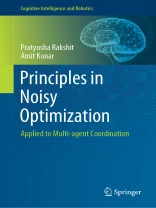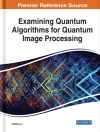Noisy optimization is a topic of growing interest for researchers working on mainstream optimization problems. Although several techniques for dealing with stochastic noise in optimization problems are covered in journals and conference proceedings, today there are virtually no books that approach noisy optimization from a layman’s perspective; this book remedies that gap.
Beginning with the foundations of evolutionary optimization, the book subsequently explores the principles of noisy optimization in single and multi-objective settings, and presents detailed illustrations of the principles developed for application in real-world multi-agent coordination problems. Special emphasis is given to the design of intelligent algorithms for noisy optimization in real-time applications. The book is unique in terms of its content, writing style and above all its simplicity, which will appeal to readers with a broad range of backgrounds.
The book is divided into 7 chapters, the first of which provides an introduction to Swarm and Evolutionary Optimization algorithms. Chapter 2 includes a thorough review of agent architectures for multi-agent coordination. In turn, Chapter 3 provides an extensive review of noisy optimization, while Chapter 4 addresses issues of noise handling in the context of single-objective optimization problems. An illustrative case study on multi-robot path-planning in the presence of measurement noise is also highlighted in this chapter. Chapter 5 deals with noisy multi-objective optimization and includes a case study on noisy multi-robot box-pushing. In Chapter 6, the authors examine the scope of various algorithms in noisy optimization problems. Lastly, Chapter 7 summarizes the main results obtained in the previous chapters and elaborates on the book’s potential with regard to real-world noisy optimization problems.
Tabela de Conteúdo
Chapter 1. Foundations in Evolutionary Optimization Algorithms.- Chapter 2. Multi-agent Coordination.- Chapter 3. Evolutionary Algorithms in Presence of Noise.- Chapter 4. Learning based Noisy Optimization.- Chapter 5. Noisy Coordination in Multi-objective Settings.- Chapter 6. Integrating Principles of Noisy Optimization with Evolutionary Optimization.- Chapter 7. Conclusion and Future Direction.
Sobre o autor
Dr. Pratyusha Rakshit received her B.Tech. degree in Electronics and Communication Engineering (ECE) from the Institute of Engineering and Management, Kolkata, India, and her M.E. degree in Control Engineering from the Department of Electronics and Telecommunication Engineering (ETCE), Jadavpur University, Kolkata, India in 2010 and 2012, respectively.
She was awarded her Ph.D. (Engineering) degree from Jadavpur University, India, in 2016 and is currently an Assistant Professor at its ETCE Department. She was awarded Gold Medals for securing the highest marks in B.Tech. in ECE and among all the courses of M.E. respectively in 2010 and 2012. She was the recipient of the CSIR Senior Research Fellowship, INSPIRE Fellowship and UGC UPE-II Junior Research Fellowship. Her principal research interests include artificial and computational intelligence, evolutionary computation, robotics, bioinformatics, pattern recognition, fuzzy logic, cognitive science and human–computer interaction. She is the author of over 50 papers published in top international journals and conference proceedings. She also serves as a reviewer for IEEE-TFS, IEEE-SMC: Systems, Neurocomputing, Information Sciences, and Applied Soft Computing.
Dr. Amit Konar is currently a Professor at the Department of Electronics and Telecommunication Engineering, Jadavpur University, Kolkata, India. Dr. Konar is the author of over 350 publications, including books/monographs, peer-reviewed book chapters and papers, all with leading international publishers. He is an Associate Editor of several prestigious journals, including IEEE Transactions, Elsevier, Springer and IOS Press, the Netherlands. He has undertaken several prestigious research projects, including UGC’s departmental research support (DRS) scheme, DIT’s national project on Perception Engineering and UGC’s excellence program in Cognitive Science. Dr. Konar was a recipient of the AICTE-accredited 1997–2000 Career Award for young teachers. He has been nominated as a Fellow of the National Academy of Engineering, and his current research interests include human–computer interfacing, cognitive neuroscience, robotics and machine intelligence.












